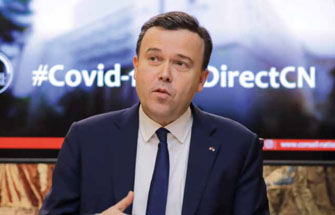The National Council has been extremely active and responsive in the context of the pandemic, in April creating within it the Special Commission for Analysis of the COVID-19 Crisis.
The Joint COVID 19 Monitoring Committees have given rise to numerous exchanges with the Government. What breakout - and lasting - progress have they made?
From the beginning of the crisis, the Assembly has acted as the conduit for the legitimate expectations and needs of Monegasques and residents. In March 2020, the National Council was ignored by the former Minister of State, which resulted in an episode of institutional tension that was not of our making. The Sovereign Prince broke the deadlock by establishing a Joint Monitoring Committee, its first meeting held as early as 30 March, which had the effect of finally enabling the institutions to work together. The necessary national unity that is essential for speaking with one voice in the face of this crisis had already been established at the National Council, where we are all working together, majority and minority parties, to formulate effective and concrete proposals. The National Council resolution unanimously adopted on 19 March already included the major measures we were waiting for. Almost all have since been implemented, particularly in the economic and social contexts. In all areas, we have sought to ensure that Monaco is a model of crisis management, and that the Principality can best position itself to be a model of recovery.
However, on the health front, we have had cause to regret that the Government does not always give itself all the resources at the right time to achieve this ambition. There have sometimes been failures of anticipation, with a shortage of masks and then delays with testing. This is where the National Council has had to play its role as a spur for the Government to move faster in the face of the urgency of the situation.
We also obtained the rapid implementation of the strengthened provisions for total temporary lay-off (CTTR), and direct support for self-employed workers, traders and impacted economic actors. We have mobilized all the resources of the National Council to match the urgency of the situation, calling no fewer than 6 public sessions within a few weeks. We voted for a first corrective crisis budget on 21 April, unlocking EUR 350 million, to provide the Government with all the means necessary to deal with this difficult situation.
At the time I am answering you, in the autumn of September 2020, the members of the National Council have asked that Covid-19 screening be centralized and that resources for testing be increased. Minister of State Pierre Dartout has heard the request and a National Screening Centre has been created at the Espace Leo Ferré, with the assistance of the Municipality and the resources of the Princess Grace Hospital.
Finally, with regard to ongoing direct aid for economic actors affected by the crisis, we believe that we must continue to be discerning and degressive, in order to continue to support the hardest-hit sectors for as long as necessary.
Working from home was a necessity during the lockdown period. When the risk of COVID is past, are you broadly in favour of encouraging remote working?
Remote working was already an option that I made possible in 2012, voting in a law on the subject following a long negotiation with the French authorities, since it was the bilateral social security agreement between Monaco and France that needed to be reviewed at the time. I was then the Minister of Health and Social Affairs. Remote working experienced a large-scale, worldwide baptism of fire on the introduction of the lockdown. Its effectiveness has been fully proven. But the shift from around a thousand remote workers to more than 10,000 in a matter of days, while obviously marking a shift that was essential for business continuity, was far too brutal. It has led to a fall in daily consumption, especially for food offerings. Leaving the crisis behind, as we return to near-normal, office-based activity, remote working will inevitably grow, but hopefully its progress will be moderate and steady, and will track the curve of growth in employee numbers.
Monaco has recently adopted legislation on Digital Tokens (ICO/STO). What do you think of this new way of financing Monegasque businesses?
Is it a good way to attract investors?
Law No. 1.491 of 23 June 2020 on token offerings is a continuation of recent reforms in the field of digital technology in the Principality.
By legislating on this new way of financing companies, Monaco has established a secure framework for raising funds in the Principality by means of a digital recording device on a shared register, such as a blockchain. This mechanism for raising capital involves issuing digital tokens in exchange for finance provided by investors.
As an alternative to traditional financing, this innovative arrangement can play a vital role for companies, start-ups and young entrepreneurs in the digital world in particular, but also in clean tech, for example.
The objective of this legal framework is to attract both investors and entrepreneurs to the Principality. The law stipulates that only a legal entity registered in Monaco can make an offering of tokens and that the funds must be deposited in a Monegasque financial institution.
These new businesses will create jobs and additional economic activity, in fields that occupy limited office space but generate very high added value. The aim is gradually to develop an entire sector of the economy in Monaco, in order to diversify further.






